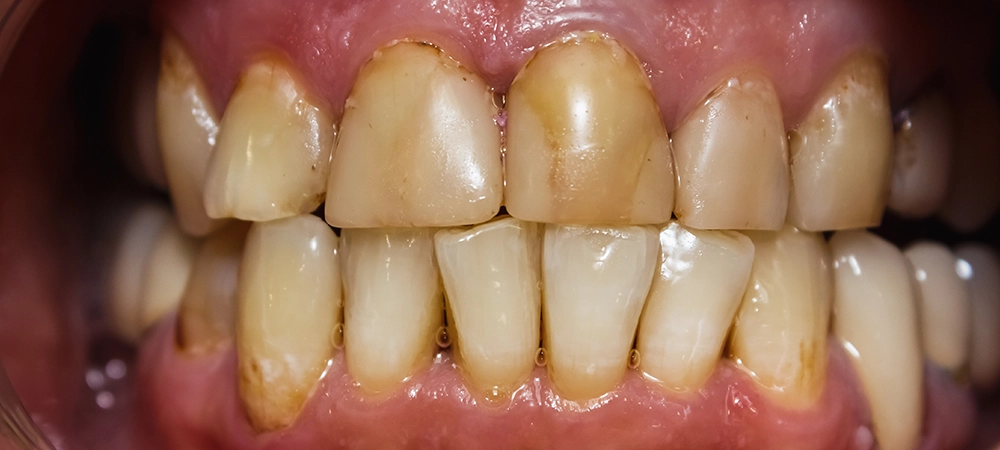Dental implants are an excellent solution for restoring missing teeth and enhancing your smile. However, their success heavily relies on the condition of your oral health.
While dental implants help to restore your smile and tooth function, poor oral hygiene and untreated dental diseases can lead to dental implant failure. Understanding the importance of maintaining a healthy mouth through regular dental check-ups can enhance the longevity and success of your dental implants.
Here’s a guide on the causes of dental implant failure.
The Foundation of Dental Implant Success: Oral Health
Dental implants are artificial tooth roots surgically placed into the jawbone to support prosthetic teeth. A healthy oral environment is paramount for these implants to successfully integrate with the bone (osseointegration) and function properly.
Poor oral health can create an unfavourable setting for dental implants, leading to potential complications and failure. Here’s how oral health causes dental implant failure.
The Risks of Poor Oral Hygiene
Neglecting proper oral hygiene practices can lead to a buildup of plaque and bacteria in the mouth. Bacteria and plaques can result in gum disease (periodontitis), which is a leading cause of dental implant failure.
Also, inflammation and infection in the gums can weaken the surrounding bone and tissues, making it difficult for dental implants to anchor securely.
Oral Health Complications and Dental Implant Failure
Apart from gum disease, untreated dental issues such as cavities, abscesses, and infected teeth can also jeopardize the success of dental implants.
These problems can spread to the surrounding areas, compromising the stability of the dental implants and potentially leading to dental implant failure.
Related Article: What to Expect at a General Dentistry Checkup at Marketplace Dentistry
The Importance of Regular Dental Check-ups
Routine dental check-ups play a vital role in preventing and detecting oral health issues at an early stage. Dentists can identify potential problems that may interfere with dental implants and address them promptly.
Regular cleanings and examinations also help maintain good oral hygiene, reducing the risk of complications during and after the dental implant procedure. Here are some ways good oral hygiene can prevent dental implant failure.
Proper Oral Hygiene Practices
Maintaining a consistent and effective oral hygiene routine is essential for preventing dental implant failure. Brushing your teeth twice daily, flossing regularly, and using an antibacterial mouthwash can help control plaque and bacteria. Also, it promotes a healthy oral environment that supports dental implant success.
Addressing Dental Concerns Before Implant Surgery
Before dental implant surgery, addressing any existing dental concerns is crucial. Some dental problems may involve treating gum disease, extracting severely damaged teeth, or resolving infections.
Likewise, ensuring that your mouth is in excellent condition before the procedure can increase the chances of a successful dental implant outcome.
The Impact of Lifestyle Factors
Lifestyle habits can also contribute to poor oral health and dental implant failure. Smoking, excessive alcohol consumption, and a poor diet can all hinder the healing process and the osseointegration of dental implants.
Also, avoiding these habits and adopting a healthier lifestyle can positively impact the success of your dental implants.
The Role of Dental Professionals in Implant Success
Qualified dental professionals play a crucial role in ensuring the success of dental implants. Their expertise and experience guide you through the process from the initial consultation to the post-operative care.
They thoroughly evaluate your oral health, taking X-rays and conducting comprehensive examinations to determine whether they suit dental implants. Also, if they identify any issues, they address them before proceeding with the procedure, thus reducing the risk of implant failure.
The Long-Term Benefits of Prioritizing Oral Health
By prioritizing your oral health, you can enhance the longevity and success of your dental implants and contribute to your overall well-being. Poor oral health has led to various systemic health issues, including cardiovascular diseases, diabetes, and respiratory problems.
Maintaining good oral hygiene practices and promptly addressing dental concerns promotes better overall health and a higher quality of life.
Related Article: How to Keep Good Dental Hygiene After Dental Implants
Expert Dental Services in Vaughan
Poor oral health can significantly increase the risk factors of dental implant failure. Taking care of your oral health through regular dental check-ups and maintaining proper oral hygiene are crucial steps to prevent dental implant failure.
By investing in your oral health, you are investing in the future of your smile. Take charge of your oral health today. Consult our expert dental team at Marketplace Dentistry for personalized guidance on achieving successful dental implant outcomes.












